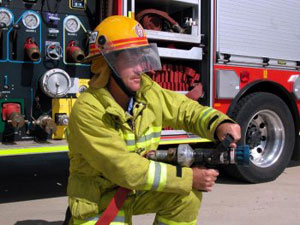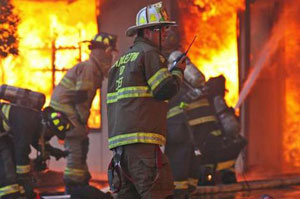Firefighter
Tasks & duties

Firefighters may do some or all of the following:
-
educate the public in fire prevention
-
check non-residential buildings for compliance with fire safety rules and regulations
-
help plan and develop evacuation schemes for non-residential buildings
-
put out fires and prevent fires from spreading using a hose or portable extinguisher
-
attend accidents or emergencies such as motor vehicle accidents, chemical spills and chemical fires
-
rescue people from buildings, vehicles or aircraft
-
conduct search and rescue operations in towns and cities
-
provide life support in the absence of ambulances
-
use their skills and equipment during natural disasters and weather-related emergencies
-
inspect fire alarms, smoke alarms and fire hydrants
-
provide fire prevention services such as installing and inspecting smoke alarms in private homes
-
test, check and maintain firefighting equipment
-
investigate fires to determine the cause to help develop fire prevention plans
-
participate in physical and emergency training
Skills & knowledge

Firefighters need to have:
-
knowledge of relevant fire safety legislation
-
knowledge of fire safety precautions, and how these relate to buildings and building construction
-
knowledge of how to handle dangerous goods
-
knowledge of different types of fires and how to deal with them
-
problem-solving skills
-
decision-making skills
-
knowledge of rescue methods
-
knowledge of how to use firefighting equipment, including practical and mechanical ability for conducting checks and maintaining this equipment
-
ability to train and educate people about fire prevention
-
good written and oral communication skills
Entry requirements
To become a trainee firefighter you need to pass literacy, numeracy and fitness tests, a medical exam and a practical skills test. You must also undergo a police background check. Once accepted into the New Zealand Fire Service you complete a 12-week training course, which involves theory and practical training.
Secondary education
School certificate or NCEA equivalent English, maths and science may be helpful to pass pre-entry testing to become a firefighter.
Training on the job
Regular training sessions are provided for firefighters, and many New Zealand Fire Service courses are linked to NZQA unit standards. Training is also available through the Royal NZ Air Force.
Useful experience
Useful experience for firefighters includes volunteer, rural, airport or armed services firefighting. Public speaking, teaching or work with community groups may also be useful.
Video
Volunteer Rural FirefighterWomen in Fire
From just a job on you tube
Related courses
Fire Technology and Rescue Services
Paramedical Studies
For more information, please refer to Career Services.
Document Actions
